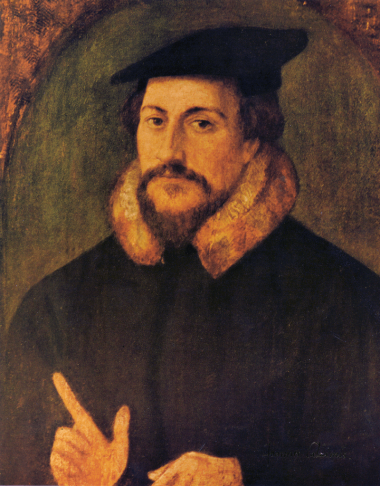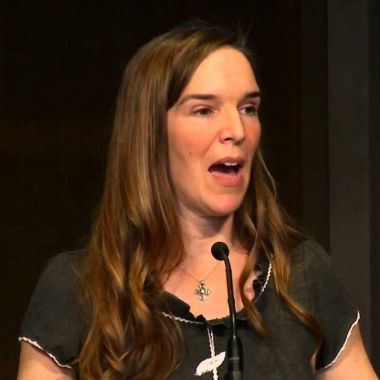Can women really love John Calvin?

To be honest almost every Christian I know that loves the work of John Calvin, the 15th century champion of the Reformation, is a man. Most of the men that I know who love Calvin also do not believe in the public ministry of women in the church. So imagine my surprise at meeting Dr Julie Canlis. Not only is she infectiously enthusiastic about Calvin she wrote a PhD on him at St Andrews University and has won prestigious awards from the Templeton Foundation and Christianity Today for her writings on his theology.
What lead you to become a Calvin scholar?
Probably because Calvin can't help but speak of God and humanity always in the same breath. We all know that we need to think of God when we are trying to define humanity. But Calvin goes further than this. A bit sheepishly (because he was a good Calvinist, you know), you will find him saying, "I know that I'm not really supposed to say this, but since God became human in Christ, we can't think about God without also thinking of humans - that is how bound together we now are." I love this! Calvin right there has so much to say to our mistaken notions of identity and individualism in the 21st century. Even we Christians can fall into the pattern of envisioning God as somehow distant from us - but Calvin says that God now refuses to be thought of except as 'somehow' inextricably tied to humanity.
I suppose this is the nature of the covenant - not a contract that our sin can break; not that we can be put on probation. But the only God we can think and talk about is the God who is for us. Any other God is a fairytale coming from our imagination.
Some Christians assume Calvin was an oppressive misogynist. Is this an unfair caricature?
For many people Calvin not only represents misogyny but full-blown misanthropy! Sin is a big emphasis in Calvin, but for Calvin the primary mark of 'original sin' is mistrust of God and projecting our fears onto God. Sin, for Calvin, is not 'sins' so much as it is our failure to present ourselves to this God in trust. After the Fall, Calvin notes that Adam and Eve hid and felt 'terror' at God. They assumed he was out to get them. This, for Calvin, was the very first (and lasting) impact of sin.
So, as you'd expect, Calvin's definition of faith is a reversal of this primary mistrust. Faith is not intellectual assent to a list of doctrines or ideas, but a transformation of our emotional life. Calvin knew this because he was naturally very anxious - he suffered from all the ailments of a stressed-out person: headaches, stomach aches, the works. He was probably a perfectionist which, as we all know, is a system whereby we sabotage ourselves.

So for him, faith was a fundamental shift in one's emotional life towards trust. He defined it as a thoroughgoing belief not just in God, but in God's goodness toward me. "Faith is a firm and certain knowledge of God's benevolence toward us." Most of us Christians believe this in our heads, but have we let it lead us to a free and spacious place, where we are not afraid of God?
How has Calvin's thought most enriched your Christian life?
This is what I like about Calvin. His theology was not an exploration of how things worked, not of how he could figure out who was damned and who was saved, but it was an exploration of God's covenant faithfulness. (I have a friend who jokes that writing the Institutes must have been therapeutic for Calvin!) Any child psychologist will tell you that a child's early years lets them know whether life and God are trustworthy. Calvin had a pretty rough, loveless childhood. He spent the rest of his life climbing out of anxiety into trust, from fear into the wide open country of salvation.
Where would you encourage someone to start if they wanted to appreciate Calvin's thought?
Book III of the Institutes, particularly Calvin's sections on repentance. What he realised was that fear and perfectionism could still sneak into one's Christian life and call the shots. So he talked about two ways of repenting - one which issued out of fear, and one which issued out of trust. He called these 'legal repentance' and 'evangelical repentance.'
Legal repentance says, 'if and only if you repent, God will forgive you.' This is captured by an if-then mentality, and is motivated by fear. The person thinks, "perhaps, if I repent properly, I can condition God to like me!" This kind of repentance leads to ongoing perfectionism (and Christian perfectionism is the worst of all!) The subtle message we pick up from this kind of repentance is that if I look perfect, act perfect, work perfect, and live perfect, I can avoid shame and judgment. I can be acceptable.
Evangelical repentance says, 'since God has forgiven you and shown his heart toward you, you can repent.' This way of repentance is based on the fact that the cross of Christ already displays God's attitude toward us. We don't have to condition him into anything, particularly to like us. He freely offers us himself in Christ, before we were even aware of it, or could respond.
The next place I'd go would be Calvin's Commentary on the Psalms. For Calvin, the Psalms were a place to stop pretending. If perfectionism is a way to hide from God and others, then in the Psalms Calvin learned to stop hiding the parts of himself that he didn't like. He couldn't believe David's honesty - so much so that he called the Psalms 'The True Anatomy of all Parts of the Soul.' In it, all the 'distracting emotions' are laid bare before God, not hidden. Through this discipline of emotional honesty, we are able to bring our whole selves (not just our respectable Christian selves) before God.
Should women really love Calvin's work?
To be honest, Yes! Although Calvin can be rough around the edges, the primary theological 'moves' he makes are earthquakes to our Christian life. He counters anyone who considers God at a distance from them, and gently urges them to reconsider their whole identity as being 'in Christ.' This is the only safe place for our fragile, perfectionistic identities.
Dr Julie Canlis' award winning book on Calvin's theology is called Calvin's Ladder.











